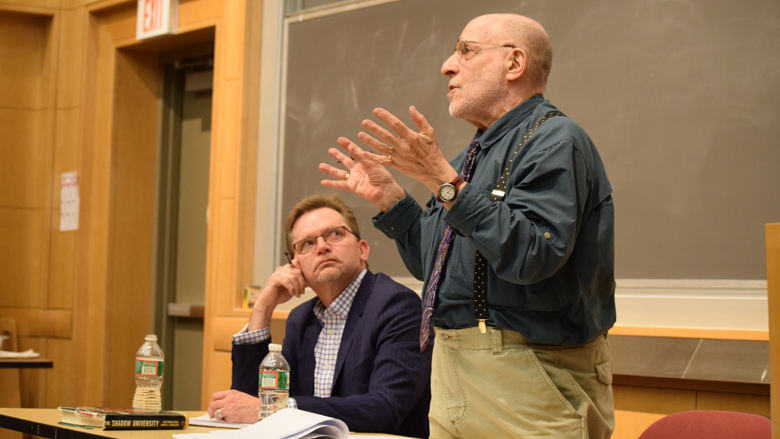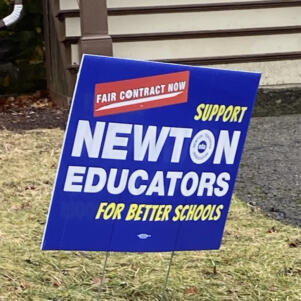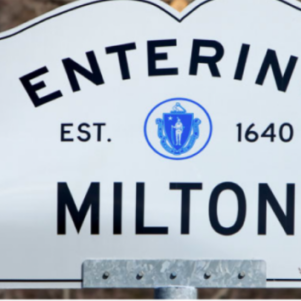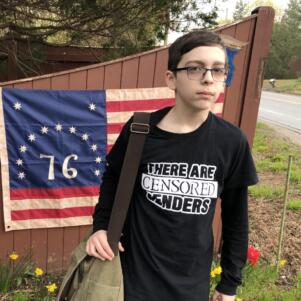Demands for ‘safe’ spaces lead to campus debates
By Kara Bettis | April 16, 2016, 19:32 EDT
 Boston College’s Kent Greenfield, left, listens as Harvey Silverglate discusses the issue of free speech on campus. (New Boston Post photo by Kara Bettis)
Boston College’s Kent Greenfield, left, listens as Harvey Silverglate discusses the issue of free speech on campus. (New Boston Post photo by Kara Bettis) NEWTON – While many Massachusetts campuses have become battlegrounds over acceptable forms of expression – such as what constitutes “hate speech” or should be considered “safe spaces” – resistance to “political correctness” has also cropped up in what amounts to a debate over a fundamental American freedom.
Even President Barack Obama commented at a town hall in September that he didn’t agree that “students at colleges have to be coddled or protected from different points of view.”
BOSTON COLLEGE
Around 100 students and faculty packed a Boston College lecture hall April 5 to hear civil liberties lawyer Harvey Silverglate and BC law professor Kent Greenfield debate the moral and social implications of hate speech in the context of Americans’ First Amendment rights.
“Counter speech,” or verbally rebutting hateful or offensive remarks, Greenfield argued, isn’t the silver bullet against hate speech that many make it out to be.
Greenfield said that allowing hate speech to go unpunished could encourage similar expressions, such as racist remarks, or lead to violence. But Silverglate warned that punishing hateful comments could lead to a dangerous silencing of those who make disagreeable statements that offend others and a muffling of honest debate over controversial subjects.
Both sides acknowledged exceptions under the law, but differed on how today’s disagreements over what constitutes acceptable speech should be handled in a college or university setting, and to what extent talk can be controlled on campus or in a classroom.“There is no confidence on campus today about who likes you and who does not,” Silverglate said. “If you prevent the punks from voicing their punkishness – you’ve made a terrible mistake.”
He added that he thought it was “backwards” that the same speech can be uttered off campus with impunity but punished if made within the confines of an academic setting. Silverglate helped start the Foundation for Individual Rights in Education, which espouses free speech.
“You don’t want to control their souls, you want to mold their minds,” Silverglate said of college students. “You can’t inhibit what they say.”
UMASS AMHERST
Faculty members at the University of Massachusetts in Amherst gathered April 8 to discuss whether to pass a resolution to ban “hate speech” on campus but free-speech advocates won a delay, buying time to press their argument that such a ban isn’t necessary and would be hazardous.
Sut Jhally, a communication professor at the state school, called the resolution “a dangerous overreaction” and questioned whether it was the appropriate response to such incidents.
“If I were an untenured younger teacher I would think twice about teaching a controversial issue,” he told the Springfield Republican newspaper’s MassLive.com website.
Concern’s arose on campus in response to incidents that began in 2014 and have continued into this year. Recently, the school was among several universities targeted by an off-campus hack attack that caused library printers to spew out anti-Semitic posters. In another incident, the words “stop Islam” were found written in chalk at the Fine Arts Center.
Seeking a structured way to address controversial topics, a handful students have formed the University Union, modeled after Oxford University’s Oxford Union debate society in the U.K.
Led by junior Owen Wiggins, 21, from Norwell, Massachusetts, the group hosted their third debate on April 12, looking at affirmative action. The forum featured Randall Kennedy, a Harvard Law School professor, and Peter Wood, president of the National Association of Scholars, a group that advocates for free speech on campus.
Wiggins started the Union after realizing UMass lacked a formal debate club, and that many lectures he attended seemed unbalanced.
“It doesn’t matter whether they are conservative or liberal. There’s not a lot of debate, just one-sided lectures,” Wiggins said in a recent interview. “The point of the University Union is to expose students to ideas they might not necessarily support, to learn from those ideas. You hear ideas you don’t agree with, and then hear someone respond to them.”
He added a favorite quote from John Stuart Mill, the 19th century philosopher who proverbially remarked that, “He who knows only his own side of the case knows little of that.”
Wiggins disputes the notion that freedom of speech and expression represents a threat to minority rights or related values.
“I don’t think the opposite of diversity and inclusion is free speech,” he said.
Opponents of the UMass faculty resolution won a postponement of the vote until month’s end.
RELATED: Massachusetts college students resist politically correct campus culture
Williams College in Williamstown also hosts a student-led group, Uncomfortable Learning, to bring speakers with controversial views to campus. But several of their events have been canceled because of student protests or by administrative action.
HARVARD UNIVERSITY
In Cambridge, tensions over various demands by Harvard University students, including over issues such as the crest long used by Harvard Law School, have drawn some criticism by others who say they’re being shut out or that administrators employ double standards.
RELATED: Amid activism, some Harvard Law students feel silenced
Members of an advocacy group known as Reclaim Harvard Law School have occupied a student lounge at the Ivy League institution since February to press their demands, which include the implementation of a critical race theory program, lower tuition rates for students of color and those from disadvantaged backgrounds, and the creation of a committee on diversity and inclusion. The group also joined others in the community to get the school to dump its seal, which reflects the coat of arms of an 18th century family whose wealth came partly from slavery.
Bill Barlow, a third-year law student from Los Angeles, has pushed for what he calls his right to free speech and has been outspoken in criticizing the Reclaim group. On a wall in the occupied student lounge, Barlow earlier this month put up his own posters, one of which read: “Reclaim = Trump: Both Support a Racist Ideology, Both Support Censorship of Dissent.” It was removed.
He claims he put up more than 60 posters that activists removed. He’s detailed the timeline of events at the Harvard Law Record.
“I have an underlying disagreement with Reclaim’s ideology and goals, I think it has a negative impact on academic freedom,” Barlow, 26, said. “I think that if you don’t exercise your rights you’re apt to slowly lose them.”
He added that many students won’t vocally disagree or voice their opinions at the law school for fear of being ostracized by the activists.
“People stay silent long enough that just becomes codified. I decided that I needed to exercise that right and part of that was engaging with Reclaim,” Barlow said.
He said he was not happy with the administration’s response, which was to prevent the activists to remove his posters.
“It shouldn’t have taken a faculty meeting, 68 signs, multiple emails, a Record article to take any action on signs being taken down for free speech,” he said.
Contact Kara Bettis at [email protected] or on Twitter @karabettis.











